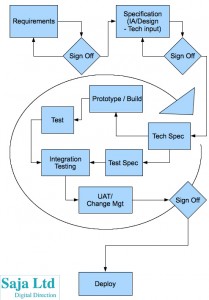
I was out walking at the weekend and the huge amount of rainfall on Saturday night resulted in some spectacular waterfalls on the Sunday, reminding me of a blog I’ve been meaning to write for a while now about my thoughts on the different types of project methodologies.
There are many methodologies for delivering projects, from the traditional Waterfall methodology to the increasingly common Agile approach. Even within these general categories there are specific approaches such as PRINCE 2, APM or SCRUM. There are many people who are firm advocates of one approach or the other, and amongst the project management world I have heard much debate about the pros and cons of each.
Before starting work with various organisations it is not usual for me to be asked about which approach I use, and I will often be advised as to the methodology that is in place at that organisation and which needs to be followed. Though I do believe a consistent approach should be employed across an organisation, or at least a programme of work, so that everybody is working the same way and can understand what is going on; I am not someone who believes that any particular methodology or approach should be employed rigidly within an organisation, nor that it should follow a text book example to the letter.
This may sound like I’m sitting on the fence but this is not the case, it is just that I prefer a more practical approach. I prefer to use a methodology that best suits the organisation, the project and the team who will be delivering it, and if it’s possible to do this within an existing framework then that would certainly be the approach I would recommend.
Never the less I find that in the Digital World there are a specific set of challenges that occur in project delivery which need flexibility and agility to be overcome, however if a purely agile project approach were to be followed then it may conflict with an organisations need for clarity on scope (what is being delivered), timescale (when it is being delivered) and cost.

For many organisations the idea of not having a signed off set of requirements, timescale and budget up front is not something that they can easily take on board. However the nature of delivering large scale digital projects does not lend itself well to a purely waterfall approach; a website is not a static entity in that the site is likely to be constantly changing throughout the project, even if this is just purely in terms of content, and these changes risk impacting the way that the end product looks and works if they are not considered frequently throughout the main delivery.
Increasingly, therefore, I am finding that a hybrid approach to delivering projects – where a more traditional waterfall methodology is combined with prototyping and iterative project delivery (a more agile methodology) – is the better way to balance the needs of the technology providers with the business owners. This more agile waterfall model can take many forms but for me the key is in understanding the business requirements up front, alongside the costs and timescales which may be constraining factors, then working on the solution with all parties (designers, developers and the requestors) in a manner that ensures that if changes are required throughout the build they can be incorporated as early as possible with minimal impact on the overall objectives. By constantly reviewing the delivery with everyone there is less chance of surprises and less chance of the end delivery being unsatisfactory.
I’d be interested in your thoughts. Do you think the days of running a strict waterfall methodology for digital projects are over? Are you an advocate of an agile approach? Or do you too think that the answer lies between them both and will be different depending on the need of the organisation?
If you’d like to know more about reviewing your project methodologies, or need support with a digital project then contact Saja Ltd we’d love to help
